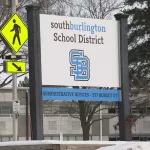
SOUTH BURLINGTON, Vt. (WCAX) – Some Vermont communities are facing massive property tax increases to fund their schools this year, like South Burlington.
School taxes are being driven up by a variety of factors, including the loss of pandemic relief funds, soaring teacher health care costs and other inflationary pressures.
Some districts are also being hit by adjustments in the state education funding formula known as the common level of appraisal or CLA. The CLA gets adjusted every year to make sure property values are looked at the same way in all towns.
When property values increase sharply like they have in Chittenden County, those school districts have to pay more into the state education fund.
South Burlington Schools Superintendent Violet Nichols is raising red flags over what she describes as a precarious spending situation.
“This is an ed funding formula that’s out of the district’s control,” she said.
On Town Meeting Day, residents will vote on a $71 million school budget which would translate to an 18% tax increase. Here’s how that translates for taxpayers: the owners of a $438,000 house– the average value in South Burlington– would pay around $1,000 more in property taxes.
Skyrocketing property values in Chittenden County are leading to higher appraised home values and a greater property tax burden.
“Those in Chittenden County, may of us are seeing dramatic increases associated with the CLA,” Nichols said.
School spending also plays a role. Across Vermont, the cost of education has continued to rise. Pandemic stimulus funds are drying up, and there are ongoing needs like mental health, new teacher contracts, spiking health care premiums and aging school infrastructure.
But some say the state needs to take a second look at school spending and where we are putting money and what we are getting in return.
“It’s a mistake to keep pouring money into a fundamentally broken system in order to fix it. We need to step back and evaluate how the system is working for kids,” said Rob Roper, a conservative commentator.
Back in South Burlington, Nichols says they cut most of the federally funded positions. She says she wants state lawmakers to put a cap on the CLA. And she says they would need to cut $8 million from arts, academics and extracurriculars to keep property tax spending flat.
“That would dramatically change what programming looks like in our schools,” she said.
What remains to be seen is how Town Meeting Day voters will respond to school spending plans, and whether Vermont lawmakers will come up with a way to reduce the property tax impact.
Related Stories:
Burlington residents face steep increase in school budget, taxes
Vt. education spending forecast to drive 18.5% property tax hike
